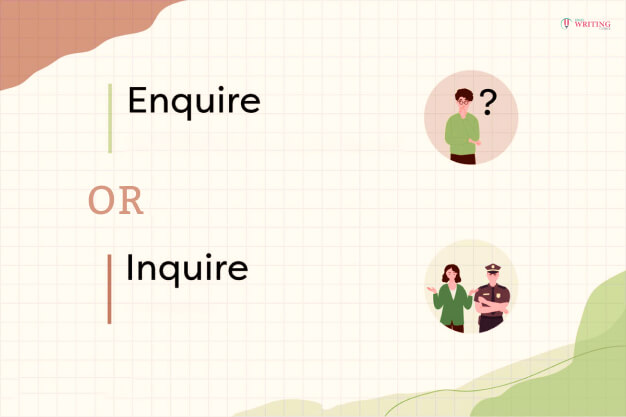The English language is not just about the 24 letters that we have. It is also about the 44 different sounds, homophones, silent letters, and a lot more. And not just that, there are different spellings for one similar word and also American English and British English. There are many ways in which the Engish Language can confuse you.
There are many words that confuse us, and enquire and inquire. We often ask is it enquire or inquire? Here, we are going to find out the basics that we need to know about both words. Both words come from the same Latin word, that is quaere, meaning to seek or ask. Though they have almost similar pronunciations, origins, and meanings, they cannot be interchanged in a sentence. It depends on the information you are trying to find out.
Is It Enquire Or Inquire?

Enquire is a word that is mostly used in British English, and the meaning it holds is to ask any kind of informal question. It actually originates from the 14th century. It might sound a little odd in American English, but it is quite a popular term in the United Kingdom then inquire. But there is no big difference as such between the two words other than the place they are used.
Examples:
- A lot of people enquired about the store timings for Monday.
- Can I enquire where you got that beautiful dress from?
- If you want to enroll your child in that school, you should enquire from the other parents who send their children there.
- If you like her, go and enquire about her name.
- People have been making enquires about the change in schedule.
Inquire is also a verb like enquire that seeks information. To inquire means to investigate something in detail, formally, which makes it different from enquire. If we see in terms of popularity, then inquire is more popular than enquire. It is a popular choice when we are talking about any kind of investigation.
Examples:
- The police inquired about our whereabouts during the night of the accident.
- The legal team has inquired about the papers that are required to be presented before the judge.
- During the selection of IPS, they will be inquired about any past criminal records.
- During the approval of the loan, the offices inquired about the purchases that Jenny had made.
- The legal team had inquired about the judge who would be giving the verdict to their cases.
Enquiry vs Inquiry

Here we come across the question of whether the same rules apply to the noun forms as well or not. In general, yes, it does, but if we consider worldwide, enquiry is more popular than inquiry except for the United States. It not only expresses the action of seeing information, but the term also refers to the action of getting information. The terms enquiry or inquiry can also mean:
- Any investigation: Investigating a crime, like committing murder or starting a fire.
- Requesting information: this is actually asking for a background check, screening records, or asking for a candidate.
- Reviewing facts and scientific principles: this means exploring some research works or looking for supportive information to prove a hypothesis.
But enquiry can still mean looking for informal questions. For example, when asking for a return policy or a change in schedule, then enquiery is often used. But, inquiry is generally not used in situations like this. It is used to portray things or investigations which are more formal. For example, I am here to make an inquiry about the progress in the investigation of my daughter’s murder.
When And How To Use Enquire vs Inquire?
Well, let’s not get you confused and make some pointers to get things out in the clear.
- Just like inquiry, inquire is used in American English. It is mostly used for asking for details and information. For example, the police were here to inquire about the Sharma twins who went missing last week.
- But in British English, inquire is mainly used for formal or official matters. For example, the managing committee will inquire about the issue this week.
- Enquire is used in both Australian as well as British English for making general queries and investigations. For example, I am going to enquire about this matter with HR.
Inquire is also used in Australian and British English, but enquiry is actually not used for making any official query or communication.
Is It Inquire or Enquire?
Well, I have already answered this question above, and I am not going to bore you with the same thing again. We already know that both are correct and used in different countries. Enquire or inquire meaning is almost similar, just that there is some difference in the places where we use them. But we are going to look at some examples here to make things more clear.
In British English Inquire, inquiries or inquired are used for making formal conversations.
Example: The board members inquired about my previous work experience.
If you want to inquire about the application status, you need to visit the main building.
In British English Enquire, enquiries or enquired are used in not-so-formal situations.
Example: My relatives enquired about my knee injury after the accident I had.
Wrapping Up!
For now, we have decided to end the debate about enquire or inquire, or enquiring vs inquiring. The above-given examples and explanations should be helpful, and basically, just keep in mind enquire is used in British English mostly and is less formal situations, and inquire is used in American English and mostly to investigate formal situations.
Additional Reading:
- Prioritizing Health: Write Health Is Wealth Essay
- Tips And Examples To Write An Essay For Class 5
- Enhancing Writing Skills With Narration Change Exercises
- The Happiest Day Of My Life Essay In English [ 300 – 500 – 800 words]
